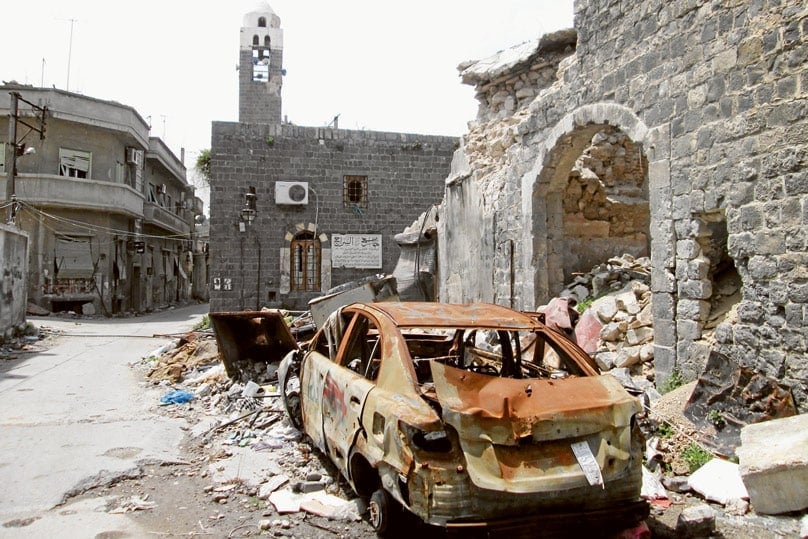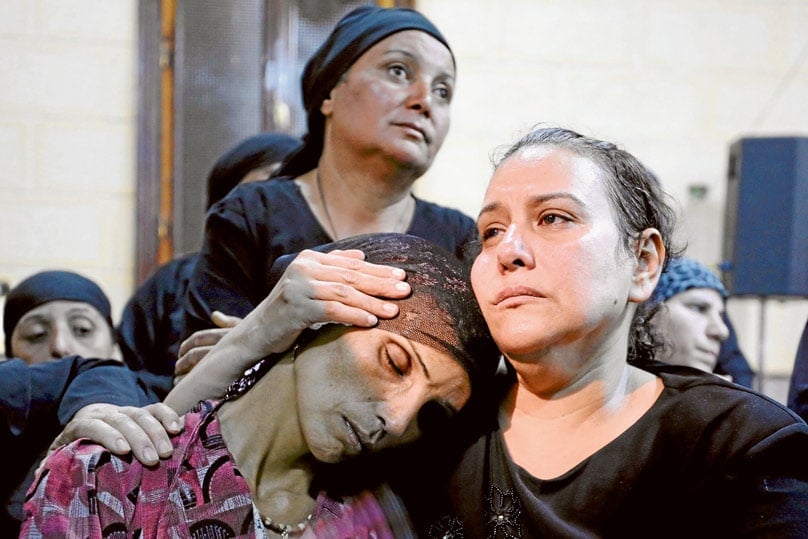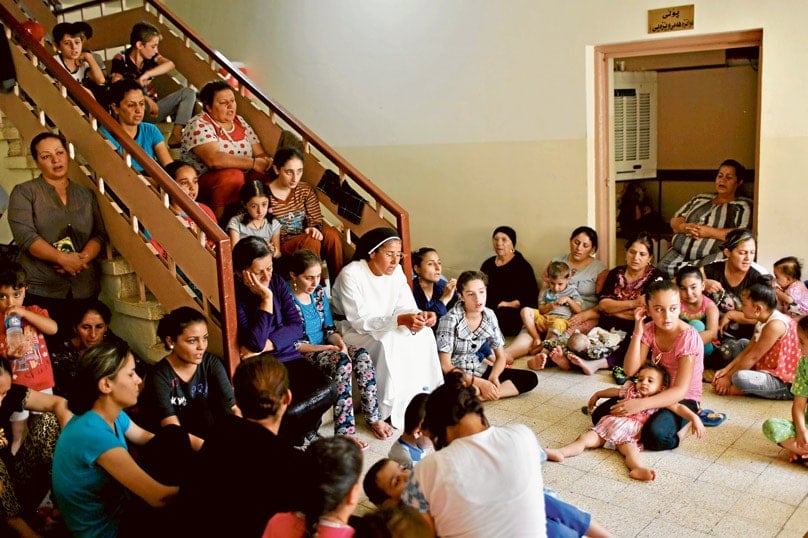
It seems that what has been the case for some time is starting to be acknowledged publicly — that Christians are the most persecuted religious group in the world today.
Over the past few years Pope Francis has spoken repeatedly about the persecution of Christians around the world, condemning both the persecution and the deafening silence from the world in response to it.
Pleading with Christians in 2015 the Pope said, “We see our brothers and sisters who are still being persecuted, decapitated and crucified for their faith in You [Jesus], before our very eyes and often with our complicit silence.” (w2.vatican.va, 3 April 2015)
The Pope doesn’t mince words here—if we are silent, we are complicit. The response from Christians, and the world, has been slow, to say the least.

The plight of persecuted Christians was again brought to the world’s attention recently with the bombings of two Coptic Christian churches in Egypt on Palm Sunday this year.
In early April Federal MP Michael Sukkar called on the Turnbull government to formally recognise the massacre of Christians in Iraq and Syria by Islamic State (ISIS) as “genocide” and NSW MP, Damian Tudehope, announced that he intends to call on the NSW state government to do likewise. In his address to the Legislative Assembly, Mr Tudehope said Christians in the Middle East have endured persecution for “a very long time” and that “it is a problem we in the West are only just waking up to now.”
The Australian Catholic Bishops Conference also acknowledged in February this year, in a submission to a Federal Inquiry into freedom of religion, that Christianity is “the most persecuted religious group in the world” and expressed concern about the growing threat to religious liberty in Western countries due to “aggressive atheism”.
The situation around the world
Christians faced harassment in 151 countries around the world in 2014, according to the Pew Research Centre—a non-partisan American think-tank—while Muslims faced harassment in 135 countries and Jews in 95.

When he was in Australia last year, American journalist John L Allen Jr, Editor of Crux and author of The Global War on Christians, said, “It is a statistical fact that today Christians are, by some order of magnitude, the most persecuted religious body on the planet.”
In his book, Allen cites President of the International Society for Human Rights, Martin Lessenthin, who estimated in 2009 that 80 percent of acts of religious discrimination around the world were committed against Christians.
The Centre for the Study of Global Christianity (CSGC) has estimated that 100,000 Christians were martyred each year from the year 2000 to 2010.
While Islamic extremism is responsible for much anti-Christian persecution today, countries with communist and atheistic regimes such as North Korea, China and Vietnam, are also some of the worst places on earth for Christians.
The CSGC estimated there have been 70 million Christian martyrs throughout history, and more than half of those were killed in the 20th century under fascist and communist regimes.

Open Doors, a charity supporting persecuted Christians, has ranked North Korea number one for persecution of Christians on its World Watch List for the 15th consecutive year. Religious freedom is non-existent under the atheistic dictatorship of Kim Jong-un and it is believed that at least 50,000 Christians are currently in concentration camps. According to reports, Christians have been publicly executed in North Korea simply for owning bibles.
In China more than 2,000 churches and crosses have been demolished since 2013, as the country’s communist government seeks to remove all public symbols of faith and bring all religions into alignment with the values of the Chinese Communist Party.
In the Middle East the most brutal persecution has been in Syria and Iraq, where violence against Christians and other minority groups such as the Yazidis, has been carried out by ISIS. Last year this brutality was formally recognised as ‘genocide’ by the Parliamentary Assembly of the Council of Europe—Europe’s leading human rights body.
ACN has reported that 700,000 Christians have fled Syria due to civil war, the rise of Islamic extremism and the incursion of ISIS. Christians in Syria have been targeted with churches desecrated and the kidnapping and killing of priests and bishops.
The intent of ISIS to remove Christianity entirely from the Middle East—a region that Christians have inhabited since the time of Christ—was made clear in February 2015, when a video showing the beheading of 21 Coptic Christians on a beach in Libya was released. The video was titled, ‘A message in blood to the nation of the cross.’
When ISIS took control of Mosul in northern Iraq in June 2014, they marked the doors of Christian homes with the Arabic symbol for ‘Nazarene’. The city’s 3,000 Christians were given the ultimatum to convert to Islam or be killed. Today there are no Christians left in the city of Mosul.
In the late 1990s there were 1.4 million Christians in Iraq. Today there are less than 275,000—less than one per cent of the population. ACN estimated in their 2013-15 report Persecuted and Forgotten, that in five year’s time there may be no Christians left in Iraq.

Some Christians however, have expressed a desire to return to their homes in Iraq, according to ACN, following the recent liberation of the Nineveh Plains and parts of Mosul from ISIS.
Different types of persecution
While threats to religious freedom in western countries do not even come close to the horror of violent persecution in other parts of the world, it is important to note that there is a slippery-slope relationship between intolerance of religion and outright persecution. ACN has identified three stages in the decline of religious liberty: firstly intolerance, then discrimination and finally outright persecution.
Pope Francis has pointed out that there exists a subtle persecution of Christians, perpetrated ironically in the name of progress (radiovaticana.va, 12 April 2016), a ‘velvet-gloved’ persecution ‘cloaked in politeness,’ that marginalises and threatens the livelihoods of those who do not adapt to laws that “go against God the Creator”.
“We see every day that the powerful make laws that force people to take this path, Pope Francis said. “If you don’t do this, you will be punished: you’ll lose your job and many things or you’ll be set aside. This is the persecution of the world.”
There are many examples of such ‘velvet-gloved’ persecution, even here in Australia.
The law in Victoria requires all doctors, including those with conscientious objections to abortion (such as Catholics) to refer women for abortions. Pro-life discussions or even silent prayer are prohibited by law within a 150-metre radius of abortion clinics.
In 2015 the Catholic bishops of Australia were required by an anti-discrimination board in Tasmania to answer a complaint about the distribution of pamphlets in Catholic schools espousing Catholic teaching on marriage.
Even though the case was eventually dropped, the fact that it even happened in a democratic country, where marriage is recognised in law as between a man and a woman, is alarming and raises serious questions about religious freedom should marriage be redefined.
While in the United States, after the re-definition of marriage to include same-sex couples was imposed on the American people in 2015 by nine Supreme Court Justices, a county clerk was temporarily jailed for refusing to issue marriage licences to same-sex couples because it contradicted her Christian faith.
In expressing concern about “a growing anti-Christian bias” in Australia, Damian Tudehope MP said, “It is frightening to think that, in a country where Christmas and Easter are national holidays, it is now considered offensive to be a Christian in public life.”
The recent media backlash against former tennis star Margaret Court, after she expressed her opposition to same-sex marriage, is an example of the increasing intolerance of Christians publically expressing their beliefs.
What can we do?
Certainly persecution is nothing new to Christianity. The founder of our religion was put to death and the symbol of our faith—the cross—is a depiction of persecution. Furthermore, Christ told us, “If they persecuted me, they will persecute you” (John 15:20).
However, Christ always called-out injustice and hypocrisy. Raising awareness about this issue and condemning the persecution is therefore imperative. The way we live our lives as Christians also makes a difference.
In Islamic countries, Christianity is often considered synonymous with the Western world, where there has been a significant decline in the number of Christians actively practising their faith.
The exiled Archbishop of Mosul in Iraq, Archbishop Amel Shamon Nona, told The Catholic Weekly earlier this year that the best way Christians in the West can support Christians in the Middle East is by living genuinely Christian lives.
We can lobby our government to take in more refugees fleeing persecution, and we can all contribute to ensuring such people are welcomed and supported when they arrive in Australia.
We can also give financial support to organisations that provide aid to persecuted Christians, such as Aid to the Church in Need and Caritas.
And then of course there is prayer. We should never underestimate the power of prayer. We need to pray for those persecuted and their persecutors, since Christ himself said, “Pray for those who persecute you.” (Matthew 5:44)
Taking a stand against persecution and defending religious liberty around the world sends a powerful message that we stand in solidarity with those being persecuted.
Our brothers and sisters in Christ need to know that their suffering is our suffering, because we believe in the Communion of Saints—the fact that we are one body in Christ.
If you want to help the persecuted Church, donations can be made to Aid to the Church in Need at www.aidtochurch.org
